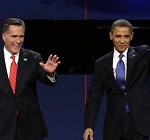It’s not clear whether Indians prefer Mitt Romney or Barack Obama but it is clear that neither of the two U.S. presidential candidates prefer India. In a 90-minute globally televised debate devoted to foreign policy, they did not name the country once. Not even when they did a leisurely stroll through our neighbourhood. A detailed discussion of the upsurge in the Middle East (our West Asia), the threat that Iran poses not just to Israel but to the U.S. itself and (what they feel) to the world, disengagement in Iraq and Afghanistan, and the need to prevent Pakistan from becoming a failed state: all this was accomplished without even a passing reference to India.
Although Obama identified terrorism as the biggest threat to security, it was Romney who put the instability in Pakistan in an appropriate framework by highlighting that it would soon have “more nuclear warheads than Great Britain,” it already has “the Haqqani network and the Taliban” and could become “a failed state.” Discouragingly, neither candidate thought to identify India as part of the solution in Afghanistan or Pakistan.
Overall, there was not much of a difference between the positions taken by the two candidates. Both wanted the U.S. to lead, i.e. to shape events, especially in the Arab world. This is really code for how to deal with the nuclear weapons programme that Iran is believed to be engaged in; even that is really a proxy for assuring the security of Israel in a region where all the old assurances, coerced and bought from Egypt and Jordan, have become worthless. Although the killing of the U.S. ambassador in Libya has acted as a caution, expect increased support to the rebels in Syria, if for no other reason than as a surrogate for an attack on Iran.
Romney, with an eye to the campaign contributions and the Jewish vote in Florida, a swing state, was more hawkish. However, in the end both he and Obama preferred to focus on even tighter sanctions against Iran rather than respond to the direct question of whether an attack on Israel would be seen as an attack on the U.S. itself. Whoever wins, for India, this position indicates greater difficulty in the import of oil from Iran as payment options become ever more constrained.
On China, Romney indulged in the aggressive rhetoric that Republicans do before they come into office. While they would like to posture as if everything that happens is about the U.S. and that it has the ability to shape the evolution of global events, developments have their own powerful local impetus which negates U.S. interventions. Remember that George W. Bush was going to defend Taiwan with all his might? In fact Taiwan has now fallen below the U.S. strategic radar. The size and extent of U.S. indebtedness to China and the interdependence of the two economies will ensure that there is no adventurism. This cannot be reassuring to Taiwan, or U.S. treaty allies Japan, South Korea and the Philippines. It will certainly be better for India, the ‘lynchpin’ of the U.S. pivot to Asia, not to be pulled into unnecessarily aggressive postures against the Chinese, with whom we have our own concerns.
There was a lot of back-and-forth on the size of the military budget, which as Obama pointed out, was already larger than that of the next 10 countries combined, including China and Russia. But it was obvious that domestic bread-and-butter issues like jobs and the housing market rather than defence were front-and-centre for the candidates and will be decisive in who wins. Here, Obama seemed to come out better.
Although foreigners like us do not have a vote, the outcome of the U.S. elections affects the world in big and small ways. Therefore we analyse the Presidential debates even though we know the positions taken bear limited resemblance to what will happen in the real, post-election world – just as who becomes the U.S. president will be determined by an arcane indirect election system based on who wins more U.S. States rather than who wins the popular vote.
Neelam Deo is India’s former ambassador to Denmark and Ivory Coast, and served in Washington and New York. She is the director and co-founder of Gateway House: Indian Council on Global Relations.
This article was exclusively written for Gateway House: Indian Council on Global Relations. You can read more exclusive content here.
For interview requests with the author, or for permission to republish, please contact outreach@gatewayhouse.in.
© Copyright 2012 Gateway House: Indian Council on Global Relations. All rights reserved. Any unauthorized copying or reproduction is strictly prohibited.


